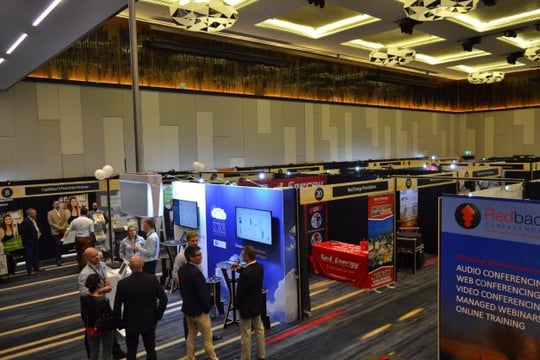Planning tips for a successful expo
by Chloe Mortimer, on 20/02/19 12:14 PM
You'll feel calmer about organising your event if you follow the below tips. Following these tips allows you to focus on the important aspects, but these tips are also to help you understand how everything is connected and will impact the success of your exhibition.
Planning
Ideally you should allow yourself months to plan your expo, and you should start implementing things 12 months out from the date of your expo, so this means that your planning needs to start happening around 15-18 months prior to the date of your expo. If you have already ran this particular expo before you may find that you don't need quite as much time for planning, but the earlier you can begin planning the more successful your expo will be.
When planning for an expo you should really think about the entirety of the event, starting with the target market that you want to attract. Who would you ideally like to be exhibitors and who would you like to attract as attendees? What is the potential of this target market and is your event likely to grow with popularity over the years?
In your planning stage you need to think about whether you will have evening parties, networking opportunities and conferences attached to your expo. Consider in what format you will run these add-on events and ensure that they can be accommodated in your expo strategy for the whole event. Planning out each action that you need to take in relation to these smaller events will increase how successful your overall expo is.
Your planning stage is also when you should create your marketing plan for the whole expo and for all the smaller events that will occur at your expo. You don't need to plan out the whole marketing plan just yet, but having an idea of your target market will lay the foundations for your marketing plan.

Build a team
You may already have a team of event professionals around you, but if you are planning a new expo from scratch chances are you won't have a team yet. Some helpful professionals to recruit onto your team are a project manager, event planner, marketing manager and sales staff. If you are working within a big company that already has a graphics and web-design department you won't have to worry about recruiting for these roles. If however you don't have any current access to these roles it is best to outsource this work.
At this stage, you should begin researching the exhibition supplier that you want to work with, and adding them to your team of professionals who will bring your expo to life. Your exhibition supplier can help with setting the packages that you will offer exhibitors as well as sharing their knowledge of exhibition products such as furniture, AV Hire and exhibition graphics.
For the purposes of a smooth bump in for your expo you should consult with your exhibition supplier before choosing a venue. Choosing a venue involves so much more than just choosing a unique space. The venue you choose will impact on your floor plan and ultimately your exhibitor sales, as well as impacting on the services that you may be able to engage. Your exhibition supplier is an extension of your team, they will be able to shed light on areas that you may not have encountered, and they will be able to recommend the best way to do things.
Plan Before Choosing a Venue
Many organisers will look at venues and choose one without proper planning. Proper planning before you choose a venue involves understanding how many exhibitors you want at your expo, how many visitors you anticipate will attend and what sort of services you want to offer such as catering or liquor. Planning and understanding the market of your expo will give you the best foundation upon which to choose your venue. There are many amazing venues that will be able to support your expo goals and ensure that you will have a successful expo.
When considering a venue, you should always consider factors such as how central the venue is to things such as public transport, restaurants and accommodation. You want to choose a venue that will be easy for your exhibitors to drive to and park at. This will make it easier for exhibitors and visitors to attend your expo, which will lead to an increase in your sales. Never underestimate the impact on your bottom line when you don't consider these factors; at the end of the day exhibitors and attendees will do what is the easiest thing for them, so if you make things difficult by choosing a venue that is hard to get to, your sales results will suffer.

Marketing Plan
When you are in the initial planning stages you should consider how you will market your expo, and you can build this out as you get further along in your organisation. After you have chosen your venue and started building your team can be a great time to establish your marketing plan. You should have a firm idea on who you want to attract in the way of exhibitors and visitors, so you will now be able to plan the best way to reach these consumers.
Many of the marketing and sales techniques that are regularly employed can be adapted to project your expo to the right people. Creating urgency around your expo is quite easy to achieve, and can really drive your sales. Things such as early bird sales for tickets or exhibitor spaces, can help increase your sales. Understanding the market that you are targeting will help you advertise your expo in a way that will appeal to them and grow your presence.
Exhibitor Satisfaction
Easily one of the most overlooked aspects of most expos is the service offered to exhibitors and how that translates into satisfaction. Your exhibitors will need graphics, furniture and AV hire on their stands or booths. Having a very clear plan on who is going to be offering that service is important. Some event organisers like to control this and have sales teams contact the exhibitors to ensure that they have all their needs taken care of. Other event organisers like to outsource this service to the exhibition supplier, provided that the exhibition supplier has a solid plan of how they will contact the exhibitors.
Listening to your exhibitor feedback is incredibly important. This doesn't mean you ignore your exhibitors until after the show and then start listening and asking for feedback. Exhibitors will give you feedback during the whole process, even when they are first considering whether to exhibit with you. They'll let you know if your spaces are too expensive for the products that you're supplying, they'll let you know if the way you have chosen to organise things isn't practical, and they'll let you know if the venue you have chosen is making it too difficult to get to. Don't ignore this feedback and think that you can just deal with it all later. You can always make changes while you are organising the expo if you have time. This is why it is important to plan and start organising 12 months out!
Your exhibitors are your primary consumers, and attracting the right exhibitors is going to impact on the visitors that your expo will attract. Visitors are your secondary customer and are equally as important as exhibitors to the success of your expo.
Planning an expo doesn't have to be as overwhelming as it may seem. Being proactive about your planning and organisation will save lots of headaches and will increase your sales.


